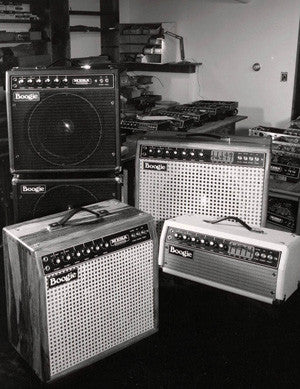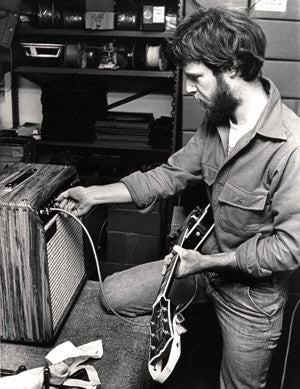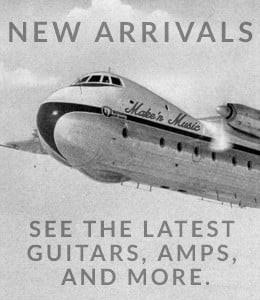Builder Profile: Mesa/Boogie
- Feb 17, 2017

Here is a builder profile done back in 2013 on Mesa Boogie Amps by our friends at Premier Guitar. Make'n Music is one of the top Mesa Boogie amp dealers in the world. We hope this article helps shed some light on the man behind this world-class guitar amp company.
From his humble origins repairing amplifiers and other musical equipment inside the confines of a meat locker in a converted Chinese grocery store in Berkeley, California, Mesa/Boogie founder Randall Smith has managed to take his company and his amplifiers to soaring heights and worldwide recognition. For almost 50 years, he’s pushed the envelope of amplification possibilities while continuously creating increasingly durable, versatile, and innovative products.
But despite all that, Smith is quite frankly a lesson in contradictions: He’s one of the industry’s most trailblazing amp designers, and yet he doesn’t play guitar. He’s a businessman who’s not out for the biggest buck, as evidenced by his steadfast refusal to send his manufacturing operation overseas. He’s an old-school, handbuilt kind of guy who simultaneously has an eye further down the road of innovation and new technology. The philosophy he lives by and has instilled in the DNA of his company is quite succinct: “Stay true to the vision, make the best amplifier or product possible, treat each customer as you yourself would like to be treated, and treat your employees the same way. It’s as simple as that.”
Meat-Locker Man
Smith grew up in the Bay Area of Northern California and, from an early age, developed two deep passions: music and electronics. His father was a professional saxophonist and clarinetist—first chair in the Oakland Symphony—and early on taught his son how to play. “One of the first things my dad taught me when he was teaching me clarinet and saxophone was tone,” Smith recalls. “The basis of good horn playing is long tones. You get used to thinking about your instrument as your voice.”
For as long as he can remember, Smith has been interested in electronics, and he had a number of mentors throughout his youth who fostered his curiosity in the electrical arts. However, when asked specifically what got him into repairing and working on amplifiers, his answer comes fast and easy, “Being in poverty.” His lifelong work with amps began one eventful evening while playing a gig with some buddies around Berkeley sometime in 1967. “One night, we were playing and the keyboard player’s Sunn 200 amp blew up. I said, ‘Let me have a look at it, maybe I can fix it.’ I saw what was the matter with it, went out and bought some parts, put it all back together, and it worked.”
The keyboard player, Dave Kessner, was thoroughly impressed and, two days later, said he wanted to open a music store and have Smith handle repair duties. Smith thought the idea had some merit and, before long, the two men rented out a converted Chinese grocery store and, voilà, Prune Music was born. The amp maker proudly confides, “My repair shop was in the former meat locker.”
Smith’s reputation as a reliable amp repairman spread like wildfire. In practically no time, the biggest acts around San Francisco—including Country Joe and the Fish, Steve Miller, the Grateful Dead, and Jefferson Airplane—were bringing in their gear. “The fact that I was both honest and reliable meant that I got a lot of good business right away.” Carlos Santana, one of Smith’s earliest and most dedicated customers was quick to recognize this quality in the man. “Randy is impeccable with his integrity, and I’ve never known him to make excuses,” Santana recently told Premier Guitar. “There is not one iota, cell, or molecule of shuck and jive in that dude.”

The Fearless Tinkerer
In addition to repairing the amps brought to him by his loyal clientele, Smith soon began modifying stock amplifiers. As an intended joke on Barry Melton of Country Joe and the Fish, Smith cut up and modified the guitarist’s Fender Princeton, replacing the 10" speaker with a 12" JBL D-120, installing a bigger set of transformers, and rewiring the circuit to match a tweed Fender Bassman. The result was a compact amp with massive amounts of power that turned the head of pretty much every guitarist who encountered it.
The day Smith put the amp out on the floor, Santana happened to stop by and became first person to play one of Smith’s creations. “I used to come down the hill to his store, Prune Music, and Randy was in the back making amplifiers,” recalls Santana. “Basically, he was making souped-up little Fender Princetons, and I just noticed that he brought something to the table when it came to enhancing and putting some turbo on amplifiers.” For Santana, playing Smith’s amp was a transformative experience: “I felt like I found what I needed. I needed an amplifier that was not hurtful, but it would sustain. You have to play so loud to sustain. I remember saying to Randy when I first played that amp, ‘Man this thing really boogies! It rocks!’”
Smith took this sustain problem—which seemed to be a ubiquitous issue frustrating guitarists of many stripes—and began trying to come up with a way to address it. “The complaint was, ‘Man, you take a [Fender] Twin, and it’s just way too loud for a medium[-sized] or a small room. I can’t turn it up to the point where it begins to sing,’ or ‘If I have a Princeton or a Deluxe and I take it to a bigger room, it ain’t cutting it—I can’t get a clean sound or even be heard.’ What I saw was this big need to separate the gain characteristics from the volume characteristics,” Smith shares. “I’m not sure I even understood it that well at the time. I knew all the guitar players that hung around our store in Mill Valley kept bringing up this need to get sustain and so forth.”
Read the rest here.






